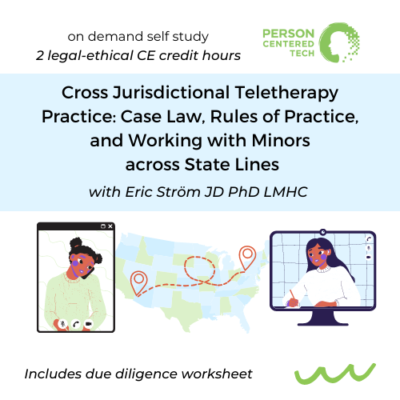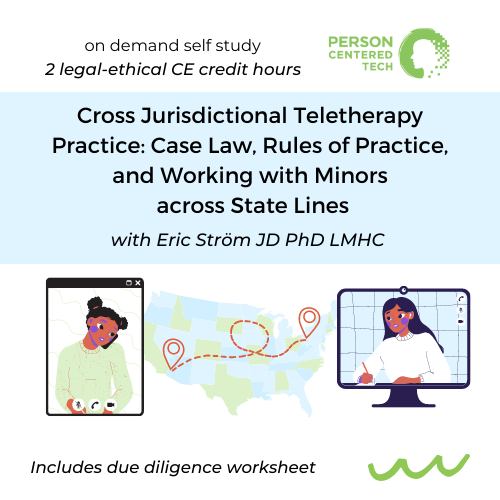Cross Jurisdictional Teletherapy Practice: Case Law, Rules of Practice, and Working with Minors across State Lines
2 CE Credit Hours. Legal-Ethical. Continuing Education Session Replay
Presented By: Eric Ström, JD PhD LMHC
While telehealth technologies have provided us with some powerful tools to continue to continue to meet client needs despite our changing environment, many behavioral health professionals are unsure of the rules and standards that apply when telehealth crosses jurisdictions.
This 2 hour law & ethics seminar is designed to present an update on the legal and ethical considerations of telehealth practice. In particular, we will discuss recent state rules laws and court cases that help in navigating cross jurisdictional telehealth practice. Participants will gain an understanding of how to strategically implement technologies in their clinical practice.
Course Description

Educational Objectives
- Identify the evolving legal standard regarding cross-jurisdictional telehealth
- Construct effective strategies to support client continuity of care across state lines
- Evaluate the clinical risks and benefits of providing telehealth services across jurisdictions
- Identify the unique challenges of inter-state telehealth with minors and families
Syllabus
- 1. Telehealth Standards
- Definition
- Ethical Standards
- 2. Effectiveness
- 3. Accessibility
- US Census
- Pew Research
- 4. Jurisdiction
- Telehealth Across State Lines
- Coaching vs. Counseling
- 5. What’s next?
References
Braeuer, K., Noble, N., & Yi, S. (2022). The efficacy of an online anger management program for justice-involved youth. The Journal of Addictions & Offender Counseling, 43, 26– 37.
Lazur, B., Sobolik, L., & King, V. (2020). Telebehavioral health: An effective alternative to in‐person care. Milbank Memorial Fund.
Luo, C., Sanger, N., Singhal, N., Pattrick, K., Shams, I., Shahid, H., Hoang, P., Schmidt, J., Lee, J., Haber, S., Puckering, M., Buchanan, N., Lee, P., Ng, K., Sun, S., Kheyson, S., Chung, D. C., Sanger, S., Thabane, L., & Samaan, Z. (2020). A comparison of electronically-delivered and face to face cognitive behavioural therapies in depressive disorders: A systematic review and meta-analysis. EClinicalMedicine, 24, 100442.
Norton, A. (2020, Winter-Spring). COVID-19 Precautions for CMHCs. The Advocate Magazine, 43(1-2), 24-26.
Norton, A. (2021, Winter). Counseling during a pandemic. The Advocate Magazine, 44(1), 10-12.
Slone, N. C., Reese, R. J., & McClellan, M. J. (2012). Telepsychology outcome research with children and adolescents: A review of the literature. Psychological Services, 9(3), 272–292
Stiles-Shields, C., Kwasny, M. J., Cai, X., & Mohr, D. C. (2014). Therapeutic alliance in face-to-face and telephone-administered cognitive behavioral therapy. Journal of Consulting and Clinical Psychology, 82(2), 349–354.
Turgoose, D., Ashwick, R., & Murphy D., (2018), Systematic review of lessons learned from delivering tele-therapy to veterans with post-traumatic stress disorder, Journal of Telemedicine and Telecare, Vol. 24, No. 9
Varker, T., Brand, R. M., Ward, J., Terhaag, S., & Phelps, A. (2019). Efficacy of synchronous telepsychology interventions for people with anxiety, depression, posttraumatic stress disorder, and adjustment disorder: A rapid evidence assessment. Psychological Services, 16(4), 621–635.
Presented/Developed By
 Eric Ström JD PhD LMHC, is an attorney and Licensed Mental Health Counselor in Seattle, Washington. As an attorney, Eric provides legal counsel, consultation, and guidance to mental health professionals. Eric’s counseling practice is focused on providing counseling services to combat veterans as well as providing supervision and consultation to other clinicians. Eric currently serves on the American Mental Health Counselors Association Ethics Committee, and is the ethics advisor for the Washington Mental Health Counselors Association. Eric has taught a range of courses in counseling and professional ethics at a variety of graduate and undergraduate programs.
Eric Ström JD PhD LMHC, is an attorney and Licensed Mental Health Counselor in Seattle, Washington. As an attorney, Eric provides legal counsel, consultation, and guidance to mental health professionals. Eric’s counseling practice is focused on providing counseling services to combat veterans as well as providing supervision and consultation to other clinicians. Eric currently serves on the American Mental Health Counselors Association Ethics Committee, and is the ethics advisor for the Washington Mental Health Counselors Association. Eric has taught a range of courses in counseling and professional ethics at a variety of graduate and undergraduate programs.
Eric earned a PhD in Counselor Education and Supervision at Oregon State University, a Master of Arts Degree in Counseling Psychology from the Northwest School of Professional Psychology at Argosy University Seattle, graduated cum laude from Wayne State University School of Law in Detroit Michigan, attended the Hague Academy of International Law in the Hague Netherlands, and received a Bachelor of Arts degree in Linguistics from the University of Michigan.
 Liath Dalton is PCT’s director and a co-owner. Liath is especially passionate about helping therapists be resourced and supported in navigating the security compliance process and identifying the solutions and processes that meet the particular needs of their practices. Liath’s consultation area of expertise is focused on selecting the right combination of services and tech that not only meet the legal-ethical needs of mental health practices, but also the functionality, efficiency, and cost-effectiveness needs as well.
Liath Dalton is PCT’s director and a co-owner. Liath is especially passionate about helping therapists be resourced and supported in navigating the security compliance process and identifying the solutions and processes that meet the particular needs of their practices. Liath’s consultation area of expertise is focused on selecting the right combination of services and tech that not only meet the legal-ethical needs of mental health practices, but also the functionality, efficiency, and cost-effectiveness needs as well.
Program Notices
Accuracy, Utility, and Risks Statement:
This program discusses strategies for complying with HIPAA and some other US Federal rules. It may not include information on all applicable state laws. Misapplication of the materials, or errors in the materials, could result in non-compliance with applicable laws or ethics codes.
Conflicts of Interest: None.
Commercial Support: None noted.
This course is subject to our cancellation/refund policy and complaint policy.

